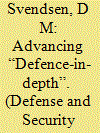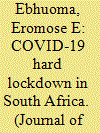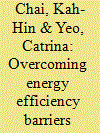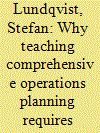|
|
|
Sort Order |
|
|
|
Items / Page
|
|
|
|
|
|
|
| Srl | Item |
| 1 |
ID:
137939


|
|
|
|
|
| Summary/Abstract |
This article aims to encourage the fostering of more systems thinking, and its greater exploitation, within the domain of contemporary intelligence. With particular focus on “micro systems thinking” and with reference to key intelligence processes, such as intelligence analysis, the utility of many systems dynamics within the intelligence context seeks to be further revealed. Through their greater collective harnessing, including up to “System of Systems” (“SoS”) dynamics, and promoting all that they can offer, more sophisticated overarching operational-to-strategic/policy “ends,” notably that of “defence-indepth,” can be viably further advanced in a sustainable manner into the future. Arguably, a much-needed transformative impact on contemporary intelligence can also be increasingly realised through comprehensively engaging in and with more systems and SoS thinking. Aiding civil protection tasks, crisis management, emergency planners, and civil contingency practitioners likewise gain.
|
|
|
|
|
|
|
|
|
|
|
|
|
|
|
|
| 2 |
ID:
186820


|
|
|
|
|
| Summary/Abstract |
As a result of South Africa recording its first COVID-19 index case in March 2020, the country imposed one of the strictest lockdowns globally. The lockdown unearthed vital lessons that climate practitioners both in South Africa – the largest emitter of greenhouse gases on the African continent – and globally can draw from to facilitate the achievement of the thirteenth Sustainable Development Goal (SDG 13). Drawing on secondary data analysis of media reports regarding South Africa’s strategy to tackle the ongoing COVID-19 pandemic, with particular emphasis on the hard lockdown, three themes emerged. These were rephrased to align appropriately with the discourse on climate change (CC). These include changing the distant framing narrative of CC, prioritizing green growth and utilizing credible messengers. Each theme is discussed critically in terms of how it will aid climate policy developers and practitioners in facilitating the attainment of SDG 13.
|
|
|
|
|
|
|
|
|
|
|
|
|
|
|
|
| 3 |
ID:
112926


|
|
|
|
|
| Publication |
2012.
|
| Summary/Abstract |
In this paper we propose a framework which categorizes energy efficiency barriers based on the stage at which the barriers exist. Barriers to energy efficiency have been widely studied but to our knowledge, except for a few studies, we found inadequate consideration for barrier-barrier interactions when proposing policy measures for improving energy efficiency. Leveraging systems thinking's power as a problem solver which identifies underlying structure that explains (similar) patterns of behavior in a variety of different situations, we attempted to identify patterns of barriers to adoption of energy efficiency measures in industrial companies. Inspired by systems thinking, the proposed framework has four stages, namely, Motivation, Capability, Implementation and Results, as well as a feedback loop. Using a case study, we show that following the four stages will lead to positive feedback for future energy efficiency implementations. The framework highlights the interconnected nature of the barriers and a need for policymakers to address these barriers in a holistic manner. We argue that the overall effectiveness of energy efficiency policies is only as strong as the weakest link in the four-stage framework. This differs from most prior research that addressed barriers in isolation, where a solution is proposed for each of the barriers without considering the relationship between the barriers. Our framework also offers a way to understand the roles and responsibilities of major stakeholders such as governments and energy service companies (ESCOs) in driving energy efficiency. This allows the assessment and identification of weak links in energy efficiency policies.
|
|
|
|
|
|
|
|
|
|
|
|
|
|
|
|
| 4 |
ID:
139210


|
|
|
|
|
| Summary/Abstract |
This article argues that the method outlined in NATO’s Comprehensive Operations Planning Directive (COPD) manual is entirely based on systems theory and describes how to apply the principles for managing system change through comprehensive operations projects. Such systems thinking is based on conceptually different principles than traditional military planning methods. Students must therefore be provided with new conceptual tools to understand and handle the complex planning process outlined in the COPD manual. Thereto, they require knowledge of its founding scientific theories to meet academic standards. The concluding message is that military teachers and students must widen their individual mental frames of reference through a transformational learning process to obtain the comprehensive understanding required to fully manage the COPD process. Moreover, they need to prepare for facilitating dialogues in the less mature comprehensive operations planning teams of real-life situations.
|
|
|
|
|
|
|
|
|
|
|
|
|
|
|
|
|
|
|
|
|